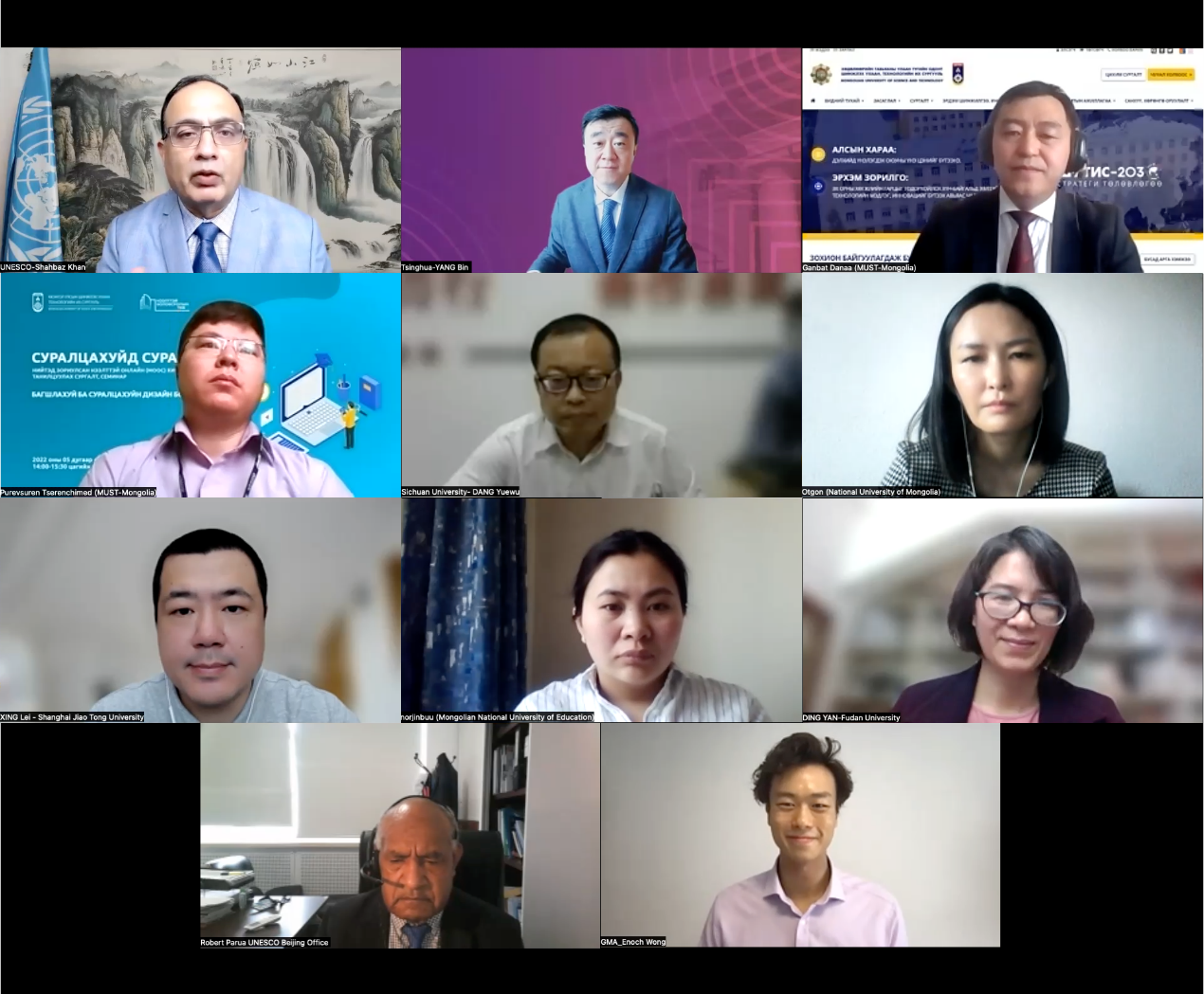To promote mutual understanding through reviewing our past experiences and present actions in teaching and learning, and envision the exciting shared future of higher education together, China-Mongolia Online Education Dialogue 2022 hosted by Global MOOC and Online Education Alliance was recently held. With the theme of “Online Education and Teacher Professional Development,” this event aimed to actively explore the extensive and in-depth cooperation between the two countries and provide a reference for future development planning in the process of the digital transformation of higher education.

Shahbaz Khan, Representative of UNESCO China, Yang Bin, Vice President and Provost of Tsinghua University and Convenor of the Executive Committee of Global MOOC and Online Education Alliance, and Ganbat Danaa, Director of the Open Education Center of the Mongolian University of Science and Technology and Executive Committee Member of Global MOOC and the Online Education Alliance delivered opening speeches. Enoch Wong, the assistant secretariat of Global MOOC and Online Education Alliance, served as the moderator of the event.
Shahbaz Khan spoke highly of the cooperation between Chinese and Mongolian universities since the outbreak of COVID-19, which was a significant step toward online learning resources for learners across Mongolia. The cooperation between Chinese and Mongolian universities has been deepened, with a good foundation established for cooperation in such important areas as online teaching, technical assistance, and teaching capacity development. He noted that global higher education institutions need to reposition themselves in the post-pandemic era and actively transform to respond to changing social needs. UNESCO will continue to work for the quality development of global higher education and pay close attention to the application and innovation of Artificial Intelligence in education.
Yang Bin pointed out three important observations: first, we would share quality resources for international cooperation. The Global MOOC and Online Education Alliance was established for international exchanges and cooperation in joint teaching, capacity building, knowledge sharing, and public advocacy, providing a platform for university teachers to develop the theories and applications of online education. Second, we should expand integration for faculty development. We must explore and seek innovations in the integration of the two teaching models to give full play to their advantages. Third, we should seek flexible development for faculty empowerment. We should learn from the experience of extensive online education amid the pandemic. Online education not only enables teachers to teach, but also encourages them to become mentors, co-teachers, and co-learners of students, and empowers them to play a bigger role so as to build more resilient universities.
According to Ganbat Danaa, the Mongolian University of Science and Technology, as one of the founding members of the Global MOOC and the Online Education Alliance, has developed in-depth exchanges and cooperation with other members of the alliance in the past two years. The Mongolian University of Science and Technology has launched an online training program for teachers' digital skills, committed to using information technology to develop online collaboration models, using open teaching resources to promote teachers' professional development, and serving students' access to quality education.
In the case study and panel discussion, representatives from six universities delivered exciting speeches, showing successful stories of their respective practice in teacher development.
Purevsuren Tserenchimed, Senior Specialist of the Open Education Center of the Mongolian University of Science and Technology, mentioned that facing various challenges during the pandemic, the key aspect of teacher development is to enhance the competence of digital skills for the teachers and motivate a sensitive direct and learning community for teachers.
According to Dang Yuewu, Dean of Academic Affairs Office of Sichuan University, Sichuan University adheres to the principle of keeping pace with the times in education and teaching, strengthens teaching reform and innovation, deeply stimulates teachers' endogenous motivation, and constantly improves their teaching ability through three levels of double certificates, workshops and teaching innovation competition.
Otgontsetseg Sukhbaatar, Head of the Center for Faculty Development and Digital Learning of the National University of Mongolia, introduced the faculty development system and emphasized the importance of teachers' online skills, network security, and curriculum design.
Xing Lei, Assistant Director of the Center for Teaching and Learning Development of Shanghai Jiaotong University, introduced the trinity system of teacher training: evaluation, training, and certification. Shanghai Jiaotong University improves teachers' teaching quality through various types of training, provides feedback on teaching improvement for courses, teachers, and institutions through the "MATE" evaluation system, and provides qualification identification and process guarantee for teachers' professional development through the Core Quality system.
Norjinbuu Baljinnyam, Lecturer in the Department of Information Technology of the Mongolian National University of Education, mentioned that this year, the Mongolian National University of Education launched the Education Quality Development Year, focusing on large-scale training activities such as teacher continuing education webinars, "digital teacher" long-term training, online teaching organization and method training to improve teachers' teaching ability in the digital era.
Ding Yan, Associate Researcher of the Research Institute for Higher Education and Deputy Director of the Center for Faculty Development of Fudan University, introduced the Fudan-QM Collaboration, which is committed to exploring quality standards that are essentially equivalent to international standards and can solve problems in the construction and application of online courses in Chinese higher education by means of course review and teacher training, combining an international perspective and taking root in the local context.
The participants also discussed the reform of the teacher training system, the formulation of teaching quality standards, and the strategic planning of teaching quality. The participants agreed that the dialogue was a complete success and hoped that the universities of the two countries could work together to promote borderless online education cooperation, explore the deep integration of teaching and education, and jointly envision and create a bright future for higher education in the digital era.
Editors: John Olbrich, Li Han

